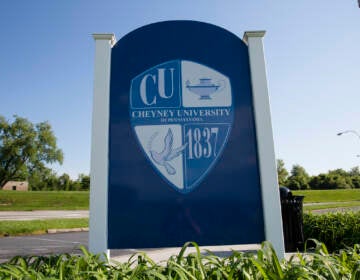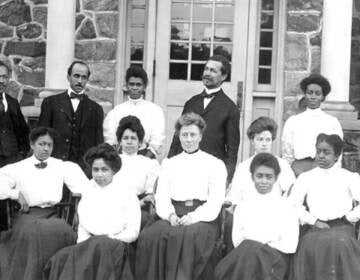For Camden’s college-bound, it may be easier to get in than to stay in
Many Camden, N.J. high school graduates who go off to HBCUs or private colleges out of state struggle mightily to afford to finish their degrees.
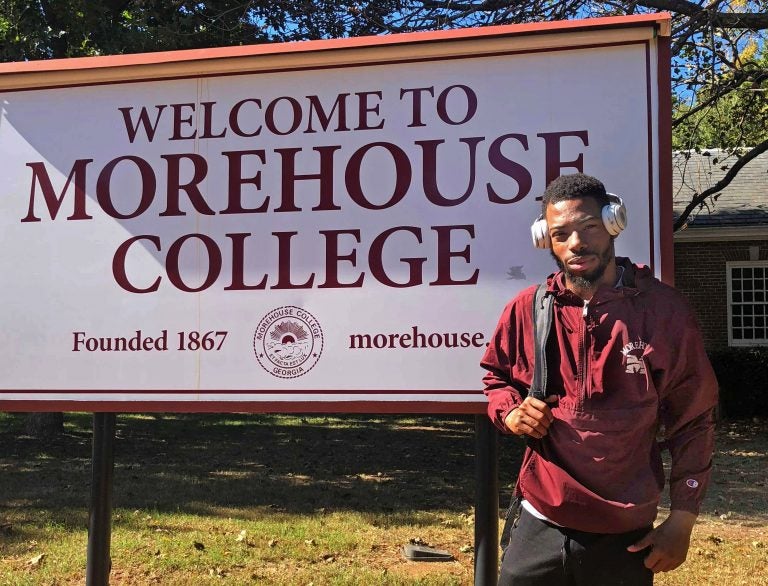
Camden student Elisha Talley this fall at Morehouse College. (Courtesy of Elisha Talley)
It was Sept. 3, 2019 and Elisha Talley was about to start a semester at Morehouse College in Atlanta the way he always does — desperately trying to raise enough money to take classes.
The Camden man was live on Facebook asking for donations to make up the $5,000 he needed for fall tuition when he was notified he’d received a $10,000 scholarship to cover his entire junior year.
“It was like magic,” Talley said of the moment, made possible by a wealthy Morehouse alumnus who heard his pleas on social media.
Back in Camden, Lanasia Bean, 18, was devastated. The 2019 Camden Academy Charter graduate discovered a week before her move-in date that she was $6,000 short for her freshman semester at Delaware State University, which, like Morehouse, is a historically black university. It was too late to apply anywhere else.
Instead, Bean joined the Army.
For Camden students, often the first in their families to attend college, skyrocketing tuition, the desire to flee a dangerous city for an out-of-state college, and a lack of parental or academic support can create a perfect storm of challenges.
Talley and Bean were particularly captivated by HBCUs, established to make higher education possible for African-American students because colleges either wouldn’t accept them or limited them, using quotas until the Civil Rights reforms in the 1960s.
They have a lot of company. HBCUs report a surge in interest in the past few years. According to a recent Harris poll, college students of color report feeling more isolated than their white counterparts, and are much less likely to describe non-HBCU campuses as “inclusive.”
The price tag for any out-of-state school, though, can be prohibitive — and there are no HBCUs in New Jersey. In a city where tuition and fees at Camden County College and Rutgers University Camden can be nearly free for students from low-income families, yearly costs of an HBCU can exceed $40,000.
-
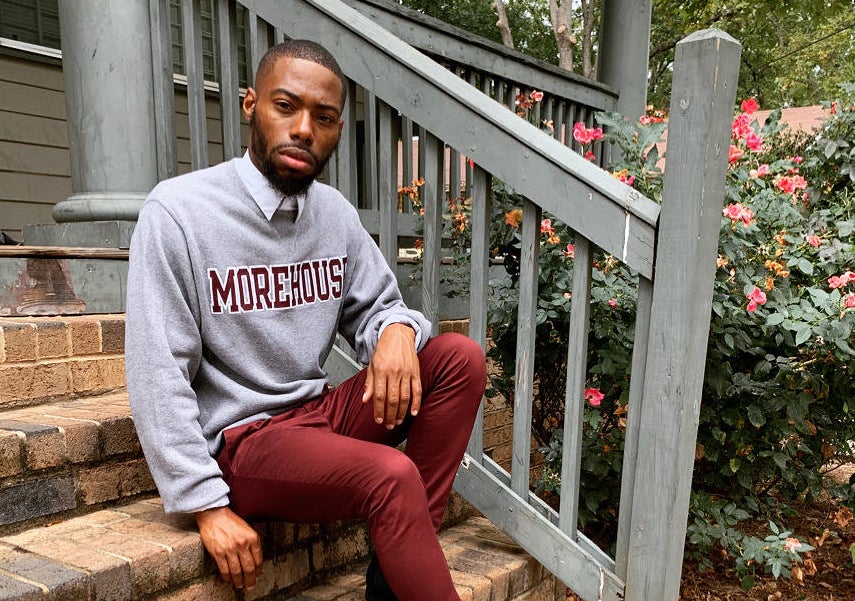
Camden student Elisha Talley this fall at Morehouse College. (Courtesy of Elisha Talley)
The price of Morehouse
For Talley, now 27, attending Morehouse — the top producer of black Rhodes scholars and whose alumni include Martin Luther King Jr., Spike Lee, and Samuel L. Jackson — was about pursuing a dream. The 2010 Camden High School graduate first attended the HBCU Shaw University in North Carolina with best friend Jamil Henry. After that school was ravaged by a tornado in 2011, Talley attended community college in Philadelphia and was applying to Morehouse when Henry was shot to death at a party in Pennsauken.
“My best friend’s death solidified my future,” said Talley. “It made me wake up.”
Henry Goodgame, Vice President for External Relations and Alumni Engagement at Morehouse, understands what a loss like that could mean to a student like Talley.
“They know tomorrow’s not promised,” he said. “Going home to a dangerous city, they don’t know if they’ll be back.”
Raised by his grandmother, Talley had been working since he was 13. Even with scholarships, the nearly $30,000 in tuition and fees he needed for Morehouse, before living expenses, was out of reach.
Talley, who plans to become a neurosurgeon or pediatrician, persevered. The first semester, he went part-time; the second semester, he had so little money for tuition that he worked instead. Morehouse friends let him crash in their dorm rooms and shared food with him.
“I had a Morehouse counselor say,” Talley remembers, “‘You came into Morehouse with no money, no place to go, no way to eat. You’re riding a bike with no wheels!’”
Talley, a chemistry major, says he won’t give up.
“This is my last chance at life, to be what I want to be … to own a nice home, drive a nice car,” he said. He also wants to inspire others.
The new scholarship from the alumnus who saw Talley’s plea on Facebook will enable him to work part-time instead of full-time while taking six classes, plus an organic chemistry lab.
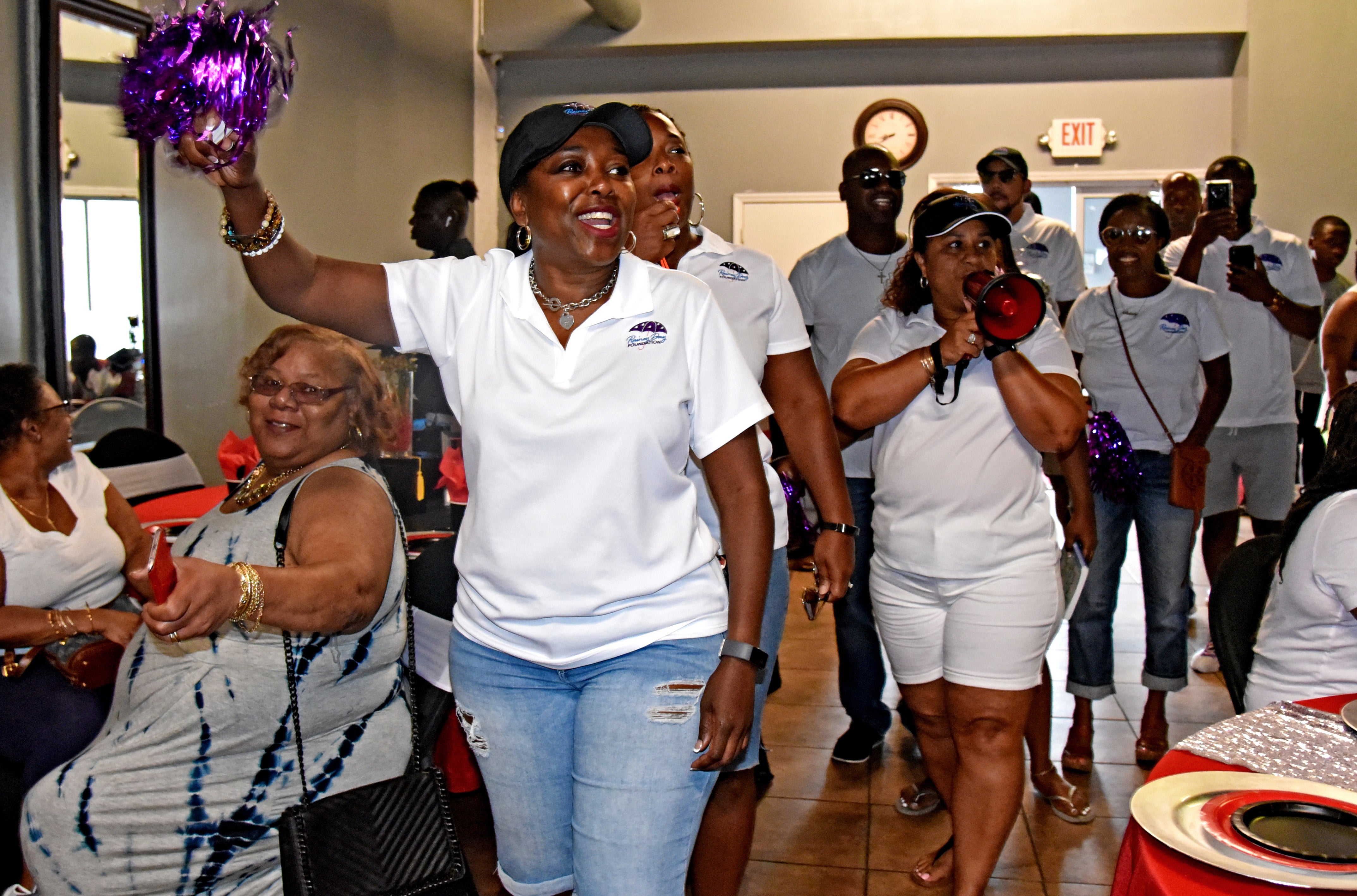
Helping Camden grads
Lorraine (“Raine”) Curtis gets it. She graduated from Camden High School in 1986 and headed to the HBCU Morgan State in Baltimore, leaving to join the workforce after two and a half years because she couldn’t afford to stay.
Years later, she and her husband became experts at SAT prep, financial aid, and NCAA rules to help a Camden niece and nephew get into college. When their classmates asked for help, Curtis saw the need.
Now 51 and a business system analyst, she established the nonprofit Rainey Day Foundation last year to help students with the financial insecurity that can force them to drop out. The foundation has assisted about 15 students so far; after Talley’s appeal, Curtis bought him a meal plan for the semester and one of her volunteers purchased two textbooks he needed.
“Elisha’s story is the reason we exist,” said Curtis. “What broke my heart was this was the first time he was going to have a meal plan.”
This summer, Curtis “crashed” five trunk parties to gift college-bound high school seniors from South Jersey, two with scholarship money and others with college necessities. Trunk parties, where family and friends gather to bestow items like linens and school supplies on departing first-year students, are especially popular in communities like Camden where students are on a shoestring budget.
One was an August celebration for Bean, who beamed as Curtis and her volunteers handed her a check for $1,000. Curtis is especially upset finances forced Bean to abandon college. She had pledged to put her on “somebody’s campus in January,” but some in Bean’s family didn’t want her to wait and convinced her to join the military.
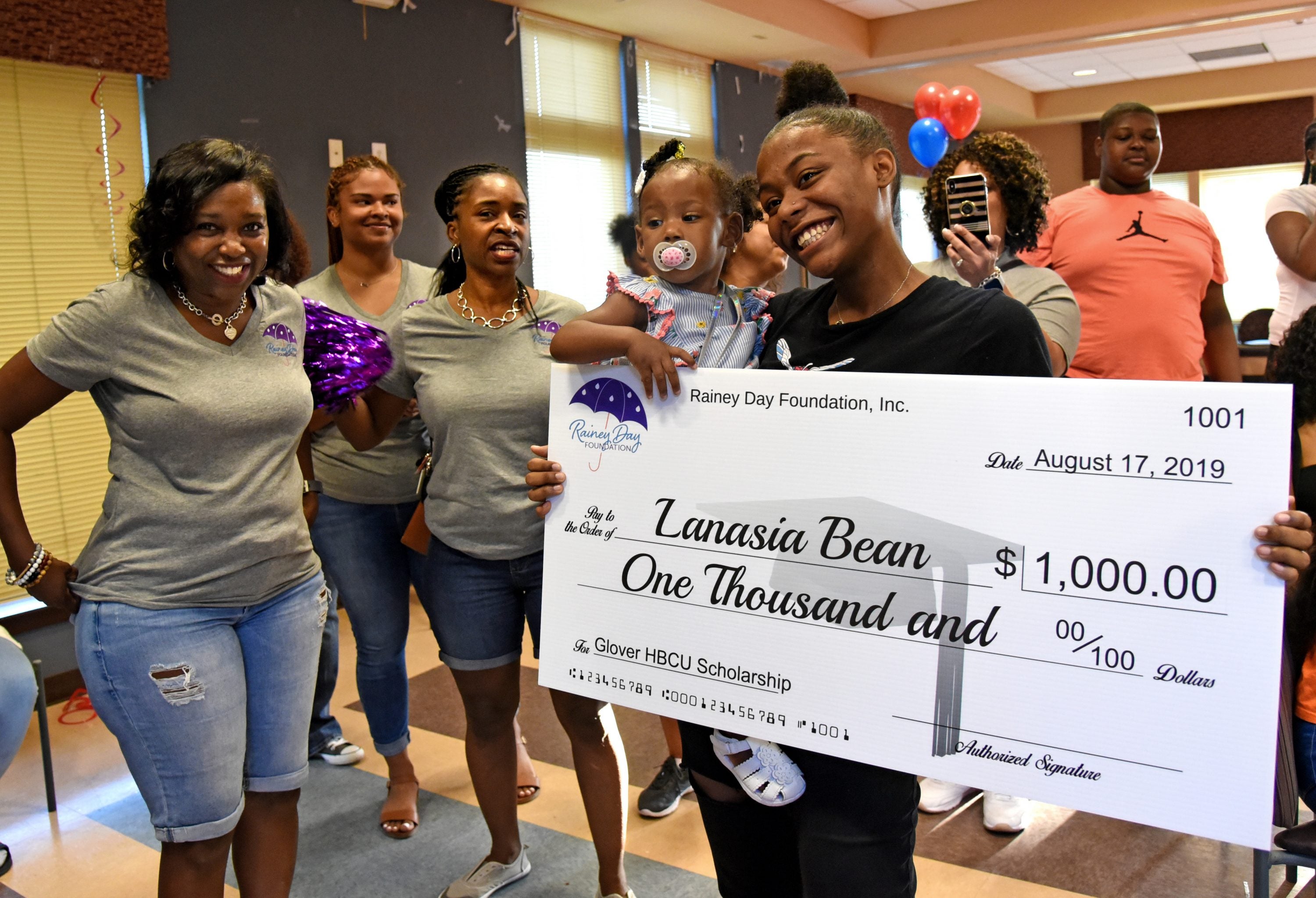
Are HBCUs a realistic choice?
For Curtis, Bean’s experience underscores the HBCU dilemma: as nurturing as these roughly 100 learning institutions are for African-American students, are they — or other out-of-state schools — worth the potential financial burden?
“There’s a glamour with Camden students about going to an HBCU,” she said. “They aspire to it, but they’re not prepared financially for what it costs to go out of state. We’ve been contacted by ten freshmen at HBCUs just this semester for help.”
HBCUs are hardly flush with funding; in recent years, many have admitted a growing number of non-black students to remain sustainable. Currently, legislation to continue $255 million in annual government aid to minority-serving colleges is stalled in the U.S. Senate, and HBCU administrators are bracing for cutbacks.
At the same time, a 2017 New York Times analysis found that black and Hispanic students were more underrepresented at the nation’s top colleges than they were 35 years earlier. Critics say “legacy admissions” at some elite colleges like Harvard support the status quo by creating a kind of affirmative action for wealthier, white applicants whose parents are alumni, faculty or donors. Ironically, says Goodgame, it’s those schools that have the resources to help some of the kids that he can’t.
“Harvard has had 300 years to build that wealth,” he said.
A lack of support from mainstream society for institutions like his that develop black excellence frustrates Goodgame.
“Why is it so difficult to hear their pleas and help students achieve their dreams?”
Bean lost out at the last minute because her mother lacked the credit for a Parents Plus loan, but Colonel Vince Ross, who runs the JROTC program at Camden High School, says that if a loan is denied early in the process, college counselors can sometimes devise a work-study or other way for a student to make ends meet.
Ross has helped three students attend his alma mater, West Virginia State, a relatively affordable HBCU where now almost three-quarters of the students are white.
“Students are eager to go,” said Ross, “but parents have no idea how to get them there.”
Youth mentor Orlando Council-Pettigrew, who recently took 37 Camden-area students on a bus tour of Howard University — one of the most selective and expensive HBCUs — said only one parent followed up with a phone call.
The reluctance to consider in-state colleges frustrates Lorraine Curtis.
“I get it,” she said, “but a lot of them are ignoring options right at home. If I had it to do all over again, I’d have found a school in New Jersey. You can still stay in Jersey and be out of Camden.”
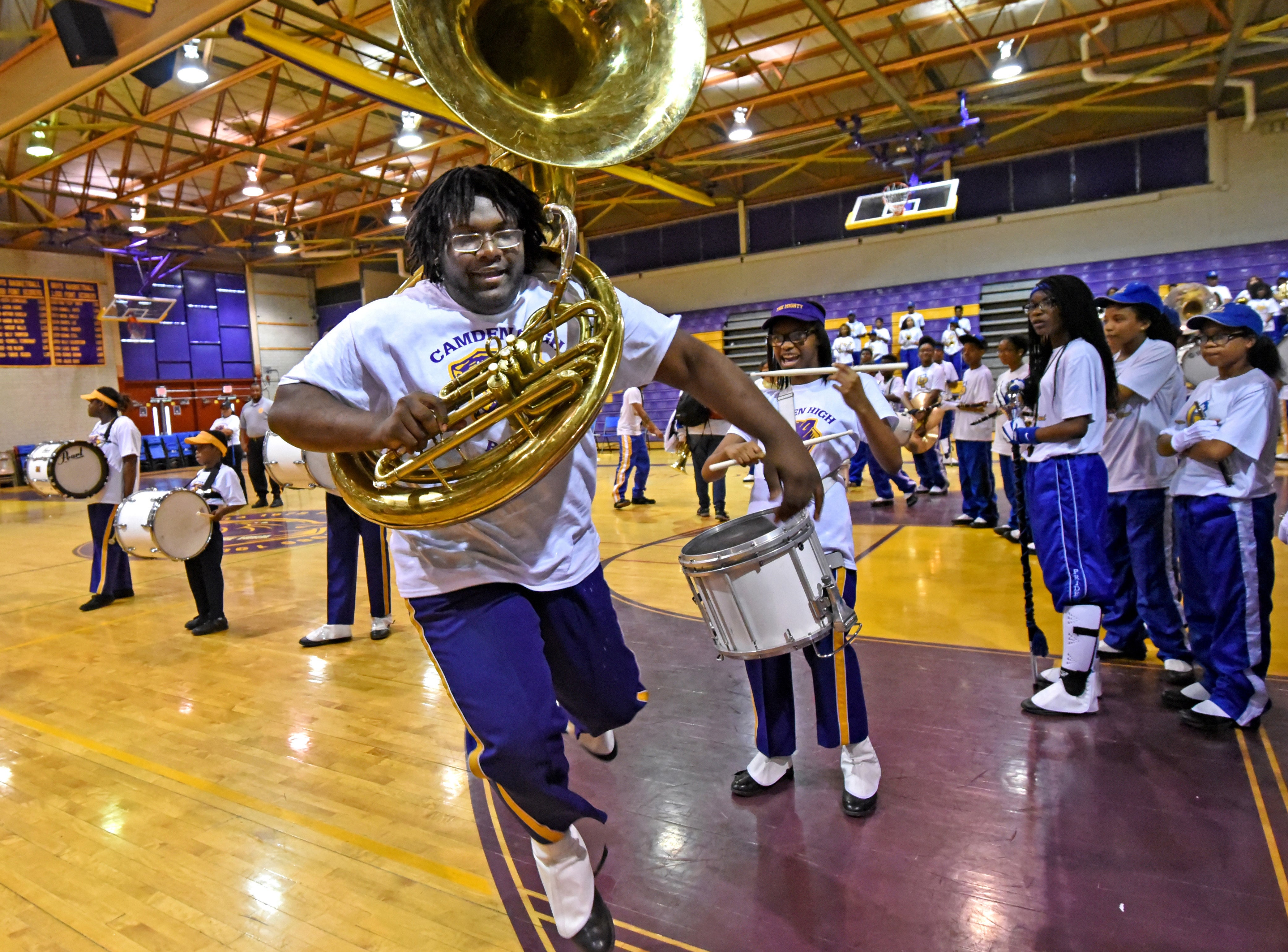
Some stay, some can’t
For 2015 Camden High graduate Noah Easley, a brief stint at Morgan State was a mistake that strained his working single mother and soured him on college. Easley was a C-student and talented tuba player with dreams of being a studio musician, but his only scholarship was worth $50.
Easley arrived at Morgan State, took on an 18-credit schedule, joined the college band, and started looking for scholarship money to help cover the more than $30,000 a year he needed. He got rid of his meal plan, and his mother bought him a microwave and refrigerator and drove to Baltimore every two weeks to buy him groceries.
After a semester and two weeks, he came back to Camden and, feeling “defeated and deflated,” got a job washing dishes. Today, he is a tile cutter, recently bought his first car, and is saving for his own apartment.
“We sell inner-city kids a dream about going away to college and being a success story,” he said, “and all it’s going to do is put you in debt.”
Meanwhile, Morgan Village Creative Arts 2017 grad Esiyah Waheed is happy at Wiley College — a smaller, less expensive HBCU in east Texas.
Waheed has had challenges, like finding money to buy an expensive choir robe and losing a scholarship when her GPA slipped from 3.0 to 2.9. She became a resident assistant to save on housing and owes $3,000 a semester after financial aid.
Still, she doesn’t regret her choice.
“The most important thing is the experience you get,” said Waheed. “Things are so much bigger than Camden, N.J. I want to encourage people to go out of state if they can.”
-
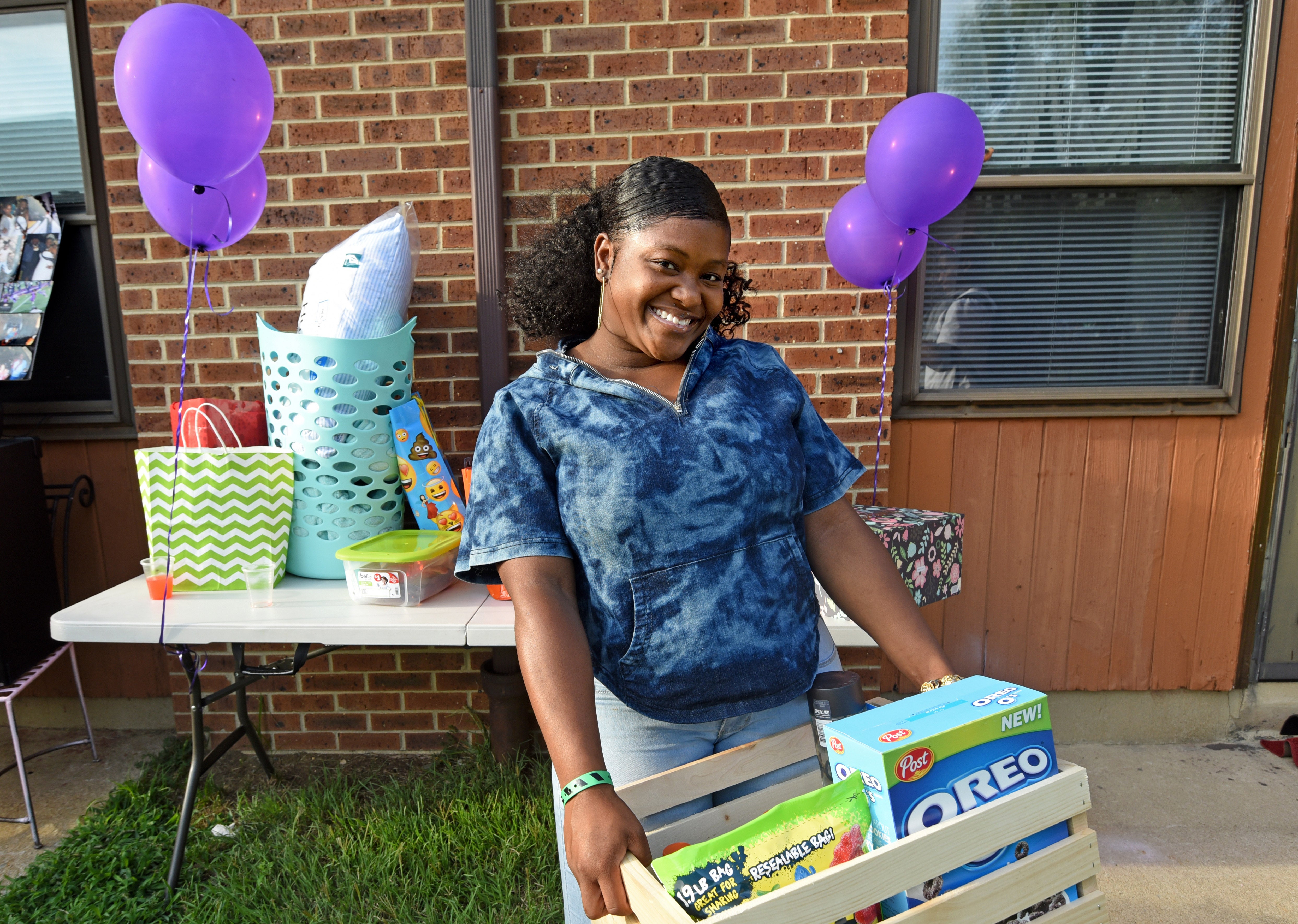
At her 2017 Camden trunk party, Esiayah Waheed holds gifts she received; she was bound for Wiley College in Texas, where she is now a junior. (April Saul for WHYY)
Options back home
In her first semester at Rutgers Camden, nursing major Da’Jah Fussell, 18, has found a satisfying college experience just down the street from where she grew up.
The 2019 Camden Promise Academy graduate was accepted at Rider University in just outside Trenton but balked at the $20,000 out-of-pocket cost. She picked Rutgers, where most of her tuition will be paid, and says dorm life has made a huge difference.
“If I’d stayed at home, I would have felt like I was still in high school.” Now, said Fussell, “I’ve become more mature than I was before.”
“It’s a culture shock because of all the whites here,” Fussell said. “But they’re not scary and they’re nice to talk to.”
-
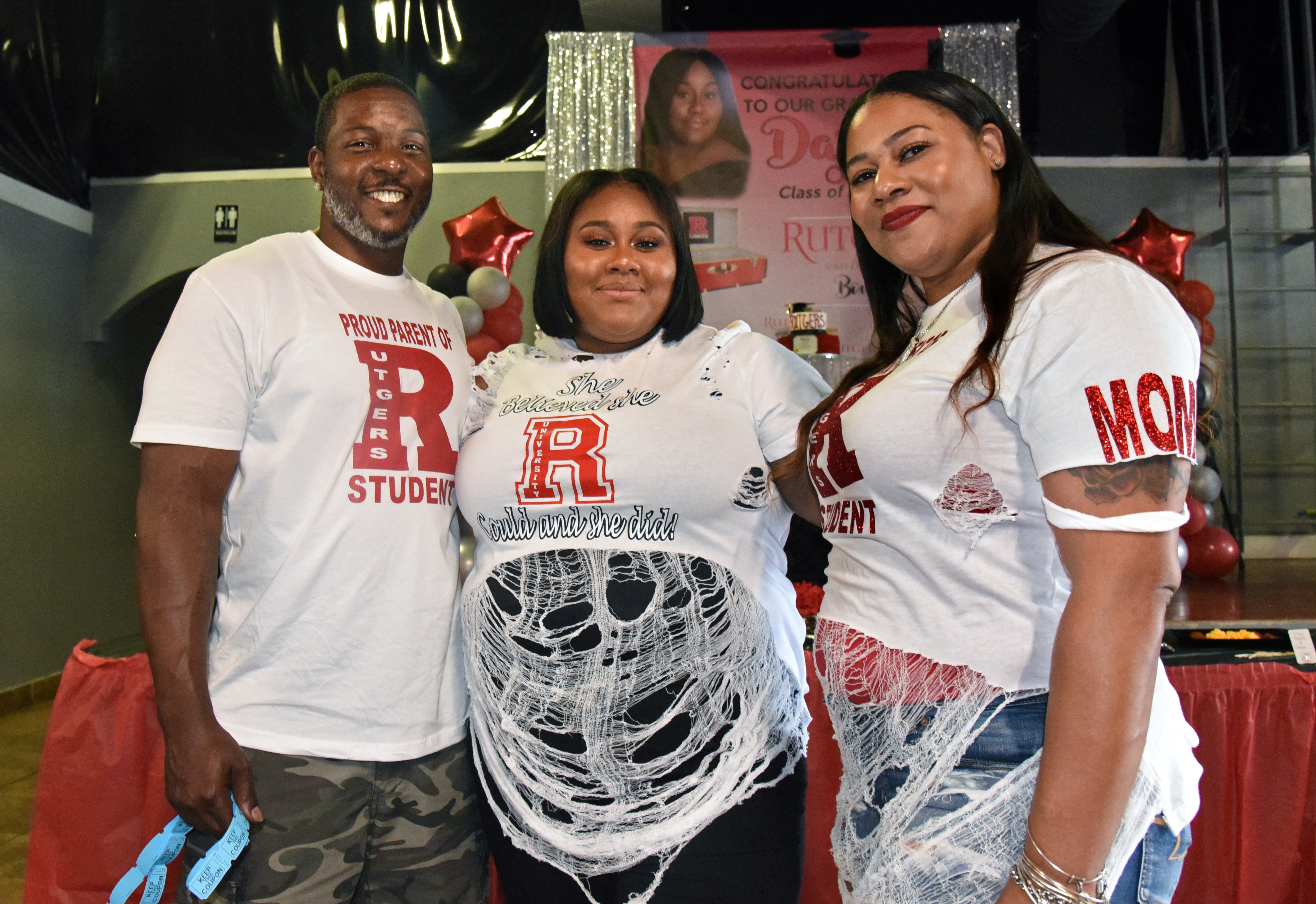
At her trunk party in August 2019, Dajah Fussell–who was headed to Rutgers Camden–poses with stepfather Michael Douglas and mother Virginia Fussell Douglas. (April Saul for WHYY)
WHYY is your source for fact-based, in-depth journalism and information. As a nonprofit organization, we rely on financial support from readers like you. Please give today.




